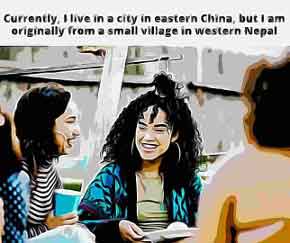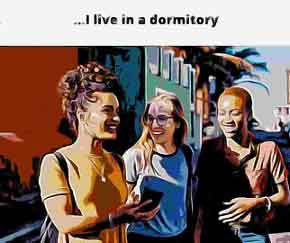‘Dónde vives’ is a Spanish phrase that means ‘where do you live?’ or ‘where do you reside?’ It is a common question that is used to ask someone about their place of residence or where they call home.
It is a way to get to know someone and learn more about their personal life and background. The phrase “dónde vives” is a conjugation of the verb “vivir,” which means “to live” or “to reside.”
The word “dónde” means “where” in Spanish and is used to ask about the location of something or someone.
Then the word “vives” is the conjugation of the verb “vivir” in the second person singular form, which is used to address one person informally.
Here are 20 ways to respond to donde vives:
Vivo en el sur de España. (I live in the southern part of Spain.)

The phrase “en el sur de España” means “in the south of Spain,” and is used to indicate the location where you reside.
Actualmente, vivo en un pequeño pueblo en el norte de Francia. (Currently, I live in a small town in the north of France.)
The phrase “actualmente” means “currently,” and is used to indicate that your current residence may be different from their previous or permanent residence.
The phrase “en un pequeño pueblo en el norte de Francia” means “in a small town in the north of France,” and is used to specify the location where you currently live.
You can use this response if the location applies to you.
Mi hogar es en Australia, pero por el momento estoy viviendo temporalmente en una ciudad en Japón por motivos laborales. (My home is in Australia, but at the moment I am living temporarily in a city in Japan for work reasons.)
The phrase “mi hogar es en Australia” means “my home is in Australia,” and is used to indicate your permanent residence.
The phrase “por el momento estoy viviendo temporalmente en una ciudad en Japón” means “at the moment I am living temporarily in a city in Japan,” and is used to indicate your current residence, which is different from your permanent residence.
The phrase “por motivos laborales” means “for work reasons,” and is used to explain the reason for the temporary change in residence.
Actualmente vivo en una ciudad en el este de China, pero soy originario de una pequeña aldea en el oeste de Nepal. (Currently, I live in a city in eastern China, but I am originally from a small village in western Nepal.)

The phrase “actualmente vivo en una ciudad en el este de China” means “currently, I live in a city in eastern China,” and is used to indicate your current residence.
The phrase “soy originario de una pequeña aldea en el oeste de Nepal” means “I am originally from a small village in western Nepal,” and is used to indicate the speaker’s place of origin.
If you wish to use this response but your location doesn’t tally, you can simply replace it with your current state.
Vivo en una casa en el campo con mi familia. (I live in a house in the countryside with my family.
The phrase “en una casa en el campo” means “in a house in the countryside,” and is used to indicate the location where you reside.
The phrase “con mi familia” means “with my family,” and is used to indicate that you live with your family.
Mi hogar está en el sur de Estados Unidos, pero actualmente estoy viviendo en una ciudad en el norte de Alemania por motivos de estudio. (My home is in the south of the United States, but currently I am living in a city in Northern Germany for study reasons.)
You can use this response if you are in your current location for study purposes. The phrase “mi hogar es en el sur de Estados Unidos” means “my home is in the south of the United States,” and is used to indicate your permanent residence.
The phrase “actualmente estoy viviendo en una ciudad en el norte de Alemania” means “currently I am living in a city in northern Germany,” and is used to indicate your current residence, which is different from your permanent residence.
The phrase “por motivos de estudio” means “for study reasons,” and is used to explain the reason for the temporary change in residence.
Vivo en una ciudad costera en el sur de Italia. (I live in a coastal city in the south of Italy.)
The phrase “en una ciudad costera en el sur de Italia” means “in a coastal city in the south of Italy,” and is used to indicate the location where the speaker resides.
Actualmente estoy viviendo en una pequeña ciudad en el centro de México, pero mi hogar es en una gran ciudad en el norte de Brasil. (Currently, I am living in a small town in central Mexico, but my home is in a large city in northern Brazil.)

The phrase ‘actualmente estoy viviendo en una pequeña ciudad en el centro de México means “currently, I am living in a small town in central Mexico,” and is used to indicate the speaker’s current residence.
The phrase ‘mi hogar es en una gran ciudad en el norte de Brasil’ means ‘my home is in a large city in northern Brazil,’ and is used to indicate the speaker’s permanent residence, which may be different from their current residence.
The verb “estoy viviendo” means “I am living” and is conjugated correctly to match the subject pronoun “I.”
Vivo en una casa en un barrio residencial en la periferia de la ciudad. (I live in a house in a residential neighborhood on the outskirts of the city.)
The phrase ‘en una casa en un barrio residencial en la periferia de la ciudad’ means ‘in a house in a residential neighborhood on the outskirts of the city,’ and is used to indicate the location where you reside.
Actualmente estoy viviendo en una ciudad en el oeste de Canadá por motivos laborales, pero mi hogar es en una ciudad en el este de Dinamarca. (Currently, I am living in a city in western Canada for work reasons, but my home is in a city in eastern Denmark.)
The phrase “actualmente estoy viviendo en una ciudad en el oeste de Canadá” means “currently, I am living in a city in western Canada,” and is used to indicate your current residence.
The phrase “por motivos laborales” means “for work reasons,” and is used to explain the reason for the temporary change in residence.
The phrase “mi hogar es en una ciudad en el este de Dinamarca” means “my home is in a city in eastern Denmark,” and is used to indicate your permanent residence, which is different from your current residence.
Vivo en una casa en el campo con mi pareja y nuestras dos hijas. (I live in a house in the countryside with my partner and our two daughters.)
The phrase “en una casa en el campo” means “in a house in the countryside,” and is used to indicate the location you reside in.
The phrase “con mi pareja y nuestras dos hijas” means “with my partner and our two daughters,” and is used to indicate that you live with their family.
Mi hogar está en una gran ciudad en el sur de África, pero por el momento estoy viviendo temporalmente en una ciudad en el norte de España por motivos de estudio. (My home is in a large city in southern Africa, but at the moment I am living temporarily in a city in Northern Spain for study reasons.)

The phrase ‘mi hogar es en una gran ciudad en el sur de África’ means ‘my home is in a large city in southern Africa,’ and is used to indicate the speaker’s permanent residence.
The phrase ‘por el momento estoy viviendo temporalmente en una ciudad en el norte de España’ means ‘at the moment I am living temporarily in a city in northern Spain,’ and is used to indicate your current residence.
The phrase “por motivos de estudio” means “for study reasons,” and is used to explain the reason for the temporary change in residence.
Actualmente vivo en una ciudad en el este de Rusia, pero soy originario de una pequeña aldea en el norte de Georgia. (Currently, I live in a city in eastern Russia, but I am originally from a small village in Northern Georgia
The phrase “actualmente vivo en una ciudad en el este de Rusia” means “currently, I live in a city in eastern Russia,” and is used to indicate your current residence.
The phrase “soy originario de una pequeña aldea en el norte de Georgia” means “I am originally from a small village in northern Georgia,” and is used to indicate your place of origin.
“Vivo en el este de (país)” – I live in the east of (country).
This response indicates your place of residence is located in the eastern portion of a specific country. It could refer to a specific city, town, or area that is located in the eastern region of the country.
This statement gives a general idea of your location but does not specify a specific address or location within the eastern region.
‘Vivo en el barrio de’ – I live in the neighborhood
‘Vivo en el barrio de’ is a phrase in Spanish that translates to ‘I live in the neighborhood of’ in English. It is used to indicate where someone resides or where their home is located.
The word “barrio” in Spanish refers to a neighborhood or district within a city or town. So when you say “Vivo en el barrio de,” you are saying that you live in a specific neighborhood or district within a city or town
“Vivo en el suburbio de (ciudad)” – I live in the suburb of the city

This means you live in a residential area outside of the city center. Hence, when asked “Donde Vives”, you can make do of this response if the place you live is situated in a suburban area.
‘Vivo en una zona rural’ – I live in a rural area
You can use this response if you live in a geographic region that is primarily rural or countryside, rather than urban or suburban.
These areas are typically characterized by low population density, limited access to urban amenities, and a strong agricultural or natural resource-based economy.
“Vivo en una comunidad cerrada” – I live in a gated community
This response says that you live in a residential area that is enclosed by gates or walls for security purposes. You can use this response if the community you stay in is designed to provide residents with a sense of privacy and security.
“Vivo en una residencia universitaria” – I live in a dormitory

This means you live in a housing facility provided by a university or college. Hence, if you stay in a dormitory and you are asked by your colleague at school, ‘Donde Vives’, this response is an apt one to consider.
“Vivo en un hotel” – I live in a hotel
If you traveled to a Spanish-speaking country for work, vacation, or touring purposes, and you had to lodge in a hotel for your time there.
This response shows that you live in temporary accommodation provided by a hotel.
Conclusion
In conclusion, the phrase “Donde vives?” means “Where do you live?” in Spanish, and is used to ask someone about their residence or place of living.
To respond to this question, you can simply tell the person where you live, using a phrase like “Vivo en [location].”
You can also provide additional information about your current or permanent residence, as well as any reasons for a temporary change in residence.
Remember to use the correct verb conjugation based on the subject pronoun. For example, if you are saying “I live,” the correct verb form is vivo, but if you are saying “we live,” the correct verb form is vivimos.